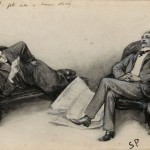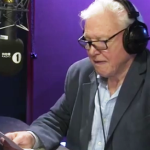 Today’s selection is from the “Really Short and Really Sweet” category — almost too sweet for it’s subject matter, in fact — and comes from Franz Joseph Haydn’s lesser-known (but obviously-talented) brother, Johann Michael Haydn. I know him mostly for his wonderful pair of trumpet concerti, but his list of sacred compositions is quite imposing, as well. Here’s “In monti Oliveti,” from his Nine Responsories for Holy Week:
Today’s selection is from the “Really Short and Really Sweet” category — almost too sweet for it’s subject matter, in fact — and comes from Franz Joseph Haydn’s lesser-known (but obviously-talented) brother, Johann Michael Haydn. I know him mostly for his wonderful pair of trumpet concerti, but his list of sacred compositions is quite imposing, as well. Here’s “In monti Oliveti,” from his Nine Responsories for Holy Week:
http://youtu.be/srhhnuB7lkEIn monte Oliveti ad patrem oravit:
Pater si fieri potest transeat a me calix iste.
Spiritus quidem promptus est caro autem infirma.
Fiat voluntas tua.On the Mount of Olives he prayed to his Father:
“Father, if it be possible, let this cup pass from me.
The spirit indeed is willing, but the flesh is weak.
Let your will be done.“
At first, I was a bit taken aback by the simplicity of the setting. But as I listened to it a couple of times, I realized that Haydn was doing some very interesting stuff inside that simplicity. Like the way the deep basses kick in right as Christ starts speaking. Or the way “the flesh is weak” gives us a sudden minor shift. Or the obvious musical acceptance of the final phrase: “Et your will be done.”
All nine are fantastic. And also surprisingly difficult to find. This version from Gyorgy Vashegyi and the Purcell Choir is about the only one I could find, and also includes this interesting discussion of the very thing I was sort-of-feeling out up above.
The texts of these nine Latin responsories for Holy Week (three each for Thursday, Friday, and Saturday servies) are taken from the Bible. Composed in 1778, they may be performed a cappella or with the accompaniment of an organ or an organ and violone (here an organ, cello, and double bass are used).The pieces aren’t “responsories” in the usual sense (they might be called canticles), for there is no response structure involving a soloist and choir as there usually is with responsorial settings of psalms. Instead, each piece consists of a short biblical text followed by a verse that sets it into relief (“It would have been better for him had he not been born,” for example); this verse generally gets a new line of music, and the choir returns to a line of the previous text to round off the piece. All are short, between one and four minutes in length, and the settings are largely homophonic. Within this ascetically simple structure, Haydn crafts sensitive music that closely follows the text and often reflects its deeper ideas.
Attribution(s): “Michael Haydn” licensed under Public Domain via Wikimedia Commons; “Bells” via Shutterstock.












